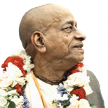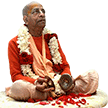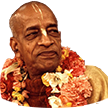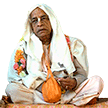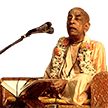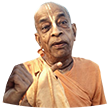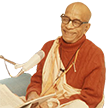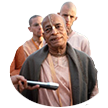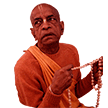Vedic Injunctions - an essential subject: Difference between revisions
(Created page with "Category:Essential Subjects <!----------------------- edit below this line -----------------------> <!------------------------ begin introduction text below --------------...") |
(Vanibot #0041: Moves Choose Another box to the end) |
||
| Line 4: | Line 4: | ||
The general public must abide by the Vedic Injunctions if they want to lead a prosperous life. Vedic injunctions are known as śruti. Human society should take advantage of the instructions from śruti and follow the principles if one wants to advance in spiritual life. In Bhakti-rasāmṛta-sindhu, Śrīla Rūpa Gosvāmī says that if one poses himself as advanced in spiritual life but does not refer to the śrutis he is simply a disturbance in society. One should follow the principles laid down in śrutis not only in one's spiritual life but in material life as well. | The general public must abide by the Vedic Injunctions if they want to lead a prosperous life. Vedic injunctions are known as śruti. Human society should take advantage of the instructions from śruti and follow the principles if one wants to advance in spiritual life. In Bhakti-rasāmṛta-sindhu, Śrīla Rūpa Gosvāmī says that if one poses himself as advanced in spiritual life but does not refer to the śrutis he is simply a disturbance in society. One should follow the principles laid down in śrutis not only in one's spiritual life but in material life as well. | ||
Srila Prabhupada's books, lectures, conversations and letters offer a comprehensive presentation of this essential subject as seen in the Vaniquotes '''[[Vaniquotes:Category:Vedic Injunctions|Vedic Injunctions]]''' category. An introduction from his books is given below in the following | Srila Prabhupada's books, lectures, conversations and letters offer a comprehensive presentation of this essential subject as seen in the Vaniquotes '''[[Vaniquotes:Category:Vedic Injunctions|Vedic Injunctions]]''' category. An introduction from his books is given below in the following 12 quotes. | ||
<!-------- end introduction text and don't touch next three lines ---------> | <!-------- end introduction text and don't touch next three lines ---------> | ||
---- | ---- | ||
== Quotes from Srila Prabhupada's books == | == Quotes from Srila Prabhupada's books == | ||
<!----------------- edit quote boxes below this line -----------------> | <!----------------- edit quote boxes below this line -----------------> | ||
{{VaniQuotebox| | {{VaniQuotebox|When one comes to the platform of visnor aradhanam, or bhakti-yoga, one has attained the perfection of life. Otherwise, as indicated in Bhagavad-gita, one is not a tattva-vadi but a veda-vadi, a blind follower of the Vedic injunctions|When one comes to the platform of viṣṇor ārādhanam, or bhakti-yoga, one has attained the perfection of life. Otherwise, as indicated in Bhagavad-gītā, one is not a tattva-vādī but a veda-vādī, a blind follower of the Vedic injunctions. A veda-vādī cannot be purified from material contamination unless he becomes a tattva-vādī, that is, one who knows tattva, the Absolute Truth. Tattva is also experienced in three features-brahmeti paramātmeti bhagavān iti śabdyate. '''(Śrīmad-Bhāgavatam 5.11.2)'''}} | ||
{{VaniQuotebox| | {{VaniQuotebox|Devotees know perfectly well that the Absolute Truth, the Supreme Personality of Godhead, is one without a second. They are never pantheists, worshipers of many Gods, for this is against the injunction of the Vedas|Devotees know perfectly well that the Absolute Truth, the Supreme Personality of Godhead, is one without a second. They are never pantheists, worshipers of many Gods, for this is against the injunction of the Vedas. Devotees completely believe, with strong faith, that Nārāyaṇa is transcendental and has inconceivable proprietorship of various transcendental potencies. We therefore recommend that scholars consult the Laghu-bhāgavatāmṛta of Śrīla Rūpa Gosvāmī, where these ideas are explicitly stated. '''(Caitanya-caritāmṛta, Ādi-līlā 5.41)'''}} | ||
{{VaniQuotebox| | {{VaniQuotebox|One who is not prepared to practice injunctions prescribed in the sastras cannot be a good man simply by book knowledge|One who is not prepared to practice injunctions prescribed in the śāstras cannot be a good man simply by book knowledge. Modern householders are practiced to different modes of life, namely to rise late and then take bed tea without any sort of cleanliness and without any purificatory practices as mentioned above. '''(Śrīmad-Bhāgavatam 1.13.31)'''}} | ||
{{VaniQuotebox| | {{VaniQuotebox|One cannot say that the living entity (jiva) takes birth or is created, for such a statement is against the injunction of the Vedas|One cannot say that the living entity (jīva) takes birth or is created, for such a statement is against the injunction of the Vedas. As stated in the Kaṭha Upaniṣad (2.18), living entities, as individual spiritual souls, can have neither birth nor death. All Vedic literature declares that the living entities are eternal. Therefore when it is said that Saṅkarṣaṇa is jīva, this indicates that He is the predominating Deity of the living entities. '''(Caitanya-caritāmṛta, Ādi-līlā 5.41)'''}} | ||
{{VaniQuotebox| | {{VaniQuotebox|By following scriptural injunctions one may enhance his appreciation for the glories of the Lord, but there is no chance for one to enter into personal dealings with Him|By following scriptural injunctions one may enhance his appreciation for the glories of the Lord, but there is no chance for one to enter into personal dealings with Him. Giving too much attention to understanding the exalted glories of the Lord reduces the chance of one's entering into personal loving affairs with the Lord. To teach the principles of such loving dealings, the Lord decided to appear as Lord Caitanya. '''(Caitanya-caritāmṛta, Ādi-līlā 3.16)'''}} | ||
{{VaniQuotebox| | {{VaniQuotebox|Apart from other living entities, the living being in the human form of body is systematically controlled by the Vedic injunctions in terms of the divisions of varna and asrama|Apart from other living entities, the living being in the human form of body is systematically controlled by the Vedic injunctions in terms of the divisions of varṇa and āśrama. A human being is expected to follow the rules and regulations of varṇa and āśrama; otherwise he cannot escape punishment by Yamarāja. The point is that every human being is expected to elevate himself to the position of a brāhmaṇa, the most intelligent man, and then one must transcend that position to become a Vaiṣṇava. '''(Śrīmad-Bhāgavatam 6.3.13)'''}} | ||
{{VaniQuotebox| | {{VaniQuotebox|The Vedic injunction is asato ma jyotir gama: everyone should give up the platform of temporary existence and approach the eternal platform. The soul is eternal, and topics concerning the eternal soul are actually knowledge|So-called educated philosophers and scientists who are simply on the mental platform cannot distinguish between what is actually sat, eternal, and what is asat, temporary. The Vedic injunction is asato mā jyotir gama: everyone should give up the platform of temporary existence and approach the eternal platform. The soul is eternal, and topics concerning the eternal soul are actually knowledge. '''(Śrīmad-Bhāgavatam 7.5.5)'''}} | ||
{{VaniQuotebox| | {{VaniQuotebox|The Vedas deal with three departments of activities. One is called karma-kanda, or activities under Vedic injunction, which gradually purify one to understand his real position|The Vedas deal with three departments of activities. One is called karma-kāṇḍa, or activities under Vedic injunction, which gradually purify one to understand his real position; the next is jñāna-kāṇḍa, the process of understanding the Absolute Truth by speculative methods; and the third is upāsanā-kāṇḍa, or worship of the Supreme Personality of Godhead and sometimes of the demigods also. The worship of the demigods recommended in the Vedas is ordered with the understanding of the demigods' relationship to the Personality of Godhead. '''(Kṛṣṇa Book, Chapter 87)'''}} | ||
{{VaniQuotebox|The Vedic injunctions are self-authorized, and if some mundane creature adjusts the interpretations of the Vedas, he defies their authority. It is foolish to think of oneself as more intelligent than Srila Vyasadeva|The Vedic injunctions are self-authorized, and if some mundane creature adjusts the interpretations of the Vedas, he defies their authority. It is foolish to think of oneself as more intelligent than Śrīla Vyāsadeva. He has already expressed himself in his sūtras, and there is no need of help from personalities of lesser importance. His work, the Vedānta-sūtra, is as dazzling as the midday sun, and when someone tries to give his own interpretations on the self-effulgent sunlike Vedānta-sūtra, he attempts to cover this sun with the cloud of his imagination. '''(Śrīmad-Bhāgavatam, Introduction)'''}} | |||
{{VaniQuotebox|Vedic injunction declares that the drinking of water may be accepted as eating or as not eating|Vedic injunction declares that the drinking of water may be accepted as eating or as not eating. Sometimes in our practical experience we see that some political leader adhering to satyāgraha will not eat but will drink water. Considering that drinking water would not be eating, Mahārāja Ambarīṣa decided to act in this way. '''(Śrīmad-Bhāgavatam 9.4.39-40)'''}} | |||
{{VaniQuotebox|Guru refers to one who gives proper direction under the authority of the Vedic injunctions and according to the examples of the lives of great personalities. The best way to mold one's life is to follow in the footsteps of the authorized personalities|A saintly person is one who follows the Vedic injunctions, which are the orders of the Supreme Personality of Godhead. The word guru refers to one who gives proper direction under the authority of the Vedic injunctions and according to the examples of the lives of great personalities. The best way to mold one's life is to follow in the footsteps of the authorized personalities. '''(Śrīmad-Bhāgavatam 4.21.28-29)'''}} | |||
{{VaniQuotebox|The so-called followers of the Vedic injunctions make their own interpretations of the Vedic injunctions, and thus they establish different parties and sects of the Vedic religion|The so-called followers of the Vedic injunctions make their own interpretations of the Vedic injunctions, and thus they establish different parties and sects of the Vedic religion. Lord Buddha directly denied the authority of the Vedas, and he established his own religion. Only for this reason, the Buddhist religion was not accepted by the strict followers of the Vedas. But those who are so-called followers of the Vedas are more harmful than the Buddhists. '''(Śrīmad-Bhāgavatam, Introduction)'''}} | |||
<!----------------- edit quote boxes above this line -----------------> | <!----------------- edit quote boxes above this line -----------------> | ||
| Line 31: | Line 39: | ||
'''Vedic Injunctions - [[Vaniquotes:Category:Vedic Injunctions|explore more within this category]]'''. | '''Vedic Injunctions - [[Vaniquotes:Category:Vedic Injunctions|explore more within this category]]'''. | ||
{{EsentialSubjectTotal}} | {{EsentialSubjectTotal}} | ||
<div style="float:left;"> | |||
{{EssentialSubjectnav}} | |||
</div> | |||
__NOTOC__ | __NOTOC__ | ||
__NOEDITSECTION__ | __NOEDITSECTION__ | ||
Latest revision as of 18:07, 22 November 2020
The general public must abide by the Vedic Injunctions if they want to lead a prosperous life. Vedic injunctions are known as śruti. Human society should take advantage of the instructions from śruti and follow the principles if one wants to advance in spiritual life. In Bhakti-rasāmṛta-sindhu, Śrīla Rūpa Gosvāmī says that if one poses himself as advanced in spiritual life but does not refer to the śrutis he is simply a disturbance in society. One should follow the principles laid down in śrutis not only in one's spiritual life but in material life as well.
Srila Prabhupada's books, lectures, conversations and letters offer a comprehensive presentation of this essential subject as seen in the Vaniquotes Vedic Injunctions category. An introduction from his books is given below in the following 12 quotes.
Quotes from Srila Prabhupada's books
Vedic Injunctions - explore more within this category.
Vanipedia has now over 903 introductory articles compiled from Srila Prabhupada's books under the series titled Essential Subjects. All these articles can be seen in the Table of Content on the right side of this article and also here in this Umbrella Category. Browse through them to relish the breadth and depth of Srila Prabhupada's teachings - There is a subject for everyone.
